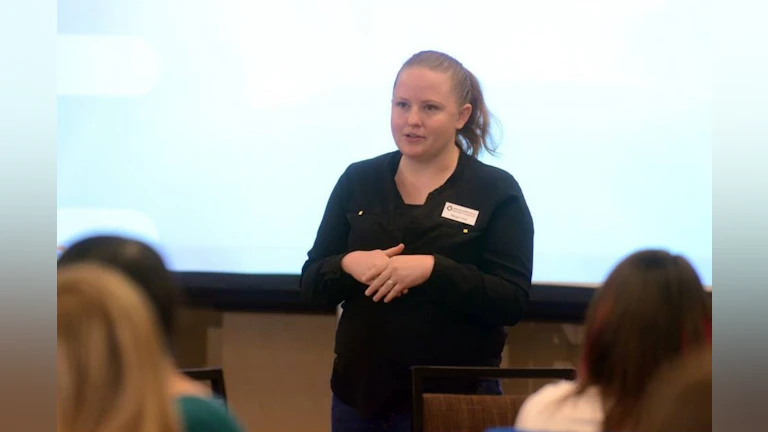Research Connection Newsletters
Read in depth about AFSP-funded research studies to learn more about the innovative ways researchers study suicide prevention
Research Connection Newsletters

What Underlying Processes Facilitate Suicide Loss Survivor Outcomes?
Dr. Yossi Lev-Belz set out to examine the role that difficulties with mentalization may play in suicide loss survivors experiencing complicated grief and suicidal ideation.

Can Specific Genes in the Blood Help Predict Suicide Risk?
Dr. Adolfo Sequeira set out to test a new method of analyzing matched brain and blood samples to see if differences in gene expression (biomarkers) existed in both the brain and the blood between individuals who died by suicide and those who died of other causes.

Highlighting the True Connection Between Research and Suicide Prevention
In those moments when a supposedly “non-science person” backs away because they find the idea of science and research dry or scary, it reminds me of the need to build that connection, so we can develop people’s interest and understanding of the important role research plays in preventing this leading cause of death.

Using Technology to Measure Suicide Risk in Teens Post-Hospitalization
Dr. Catherine Glenn, of the University of Rochester, and her colleagues set out to examine if new methods of monitoring short-term suicide risk and warning signs are feasible and acceptable (i.e., appropriate and able to be carried out) for adolescents at increased risk for suicide attempts.

Bringing Suicide Research to Students in Texas
Upon learning about AFSP’s Research Connection program, in which suicide prevention researchers come to speak about their studies to general, lay audiences in one’s local community, it seemed fitting for me to host an event, and help to highlight the importance of suicide prevention research here at home.

Neuroimaging and Suicide Prevention Research: Reviewing the Last Two Decades
Can neuroimaging connect specific brain structures and functions with suicidal thoughts and behaviors?

Research Connection: Is There a Link Between Job Stress and Suicide?
The true relationship between employment and suicide is more nuanced.

Risk and Protective Factors for Suicide Among Adolescents: A Look at Gender Identity and Sexual Orientation
Do risk and protective factors for suicide differ among adolescents depending on their gender identity and sexual orientation?

What are the risk factors for suicide in rural Chinese elderly?
Learning from this study in China can help us to understand more about what contributes to suicide around the world.

Can Addressing Suicidal Behavior and Alcohol Use Together Prevent Suicidal Behavior by Teens?
Is a brief MI intervention helpful to adolescents hospitalized for suicidal behavior who also use alcohol?

Can Medication for the Treatment of Nightmares Also Reduce Suicidal Ideation in People with Post-Traumatic Stress Disorder?
Can Medication for the Treatment of Nightmares Also Reduce Suicidal Ideation in People with Post-Traumatic Stress Disorder?

Are There Genetic Risk Factors for Suicide?
Do genes play a role in determining suicide risk, regardless of psychiatric diagnosis?

Bringing the Results of Suicide Prevention Research to Local Communities: A Spotlight Interview with Meg Graf
Meg Graf of Illinois discusses her personal connection to the cause, and how her community has benefited from the program.

How Do Healthcare Professionals Identify Suicide Risk in Cancer Patients?
The findings of the study could inform the development and use of helpful interventions to reduce suicide risk.

Are There Health Consequences When an Individual is Bereaved by their Spouse’s Suicide?
What are the short-term and long-term health consequences for people bereaved by their spouse’s suicide?

Why Do Adolescents Attempt Suicide?
For both researchers and clinicians to gain a better understanding of what contributes to an individual’s suicide attempt, Dr. David Klonsky of the University of British Columbia developed the Inventory of Motivations for Suicide Attempts (IMSA), based on several widely accepted theories of suicide.

How Do Emotions and Experiences Combine to Provoke Suicidal Ideation and Behavior?
In a study conducted by Dr. Lori N. Scott at the University of Pittsburgh, EMA was used to look at the specific relationship between participants’ emotions, interpersonal experiences, and suicidal ideation and behavior over time.

Does the Way Media Reports on Suicide Impact Rates of Suicide?
A study conducted by Dr. Mark Sinyor looked at the effect of a barrier limiting access to lethal means on the rate of suicide, as well as the impact of media attention.

Is it Possible to Assess Short-Term Risk of Suicide?
Although we’re relatively good at knowing if someone has longer term risk factors for suicide, we are not as good at assessing if someone is at risk within hours, days or weeks. In addition, the time between someone having a suicidal idea and engaging in suicidal behavior can sometimes be very short.

Can a Community Program Reduce Suicidal Ideation and Behavior in Latina Adolescents?
Suicidal ideation and suicide attempts occur at higher rates in adolescent Latinas than among girls from other ethnic groups.

Stress and Genes Linked to Suicide Attempts
Do genes related to stress influence suicidal behavior?

Crisis Counselors Use Safety Planning to Prevent Suicide
Can incorporating Safety Planning Intervention (SPI) into crisis calls aid suicide prevention?

Your Teen Has Just Made a Suicide Attempt, Now What?
How can families offer support to teens who have attempted suicide?

Understanding Recent Changes in Suicide Rates Among the Middle-Aged
Why are suicide rates increasing among the middle-aged?

Surviving Prostate Cancer Yet Thinking About Suicide
What are the suicide risk factors for survivors of prostate cancer?

Understanding Genes Can Lead to Better Treatment of Depression
How do genes present in those with MDD affect suicidal ideation?